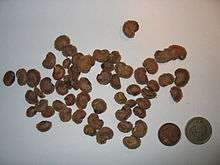Myrciaria
Not to be confused with Myrcia, also in family Myrtaceae, or Myrica, in family Myricaeae, or Myricaria, in family Tamaricaceae.
| Myrciaria | |
|---|---|
 | |
| Seeds of M. dubia | |
| Scientific classification | |
| Kingdom: | Plantae |
| (unranked): | Angiosperms |
| (unranked): | Eudicots |
| (unranked): | Rosids |
| Order: | Myrtales |
| Family: | Myrtaceae |
| Subfamily: | Myrtoideae |
| Tribe: | Myrteae |
| Genus: | Myrciaria O.Berg[1] |
| Type species | |
| Myrciaria tenella (DC.) O. Berg[2][3] | |
| Synonyms[4][1] | |
| |
Myrciaria is a genus of large shrubs and small trees described as a genus in 1856.[5][3] It is native to Central and South America, Mexico, and the West Indies, with many of the species endemic to Brazil.[4] Common names include jaboticaba, jabuticaba, guaperu, guapuru, hivapuru, sabará, and ybapuru.
The jaboticabas are a significant commercial fruit in Brazil. The fruit is grapelike in size and appearance, and often likened to a muscadine grape in taste. Myrciaria dubia, the camu-camu berry, is grown primarily in flood-zone areas of Peru and has one of the highest vitamin C (ascorbic acid) concentrations of any fruit, alongside Terminalia ferdinandiana.
- Myrciaria alagoana Sobral - Alagoas
- Myrciaria borinquena Alain - Puerto Rico
- Myrciaria cordata O.Berg - Guyana, Bolívar, N Brazil
- Myrciaria cuspidata O.Berg - Brazil, Bolivia, Paraguay
- Myrciaria delicatula O.Berg - Brazil, Bolivia, Paraguay, NE Argentina
- Myrciaria disticha O.Berg - E Brazil
- Myrciaria dubia (Kunth) McVaugh – Camu-Camu - Guyana, Venezuela, N Brazil, Colombia, Ecuador, Peru
- Myrciaria ferruginea O.Berg - E Brazil
- Myrciaria floribunda (H.West ex Willd.) O.Berg – Rumberry - from Mexico + West Indies to Paraguay
- Myrciaria glanduliflora (Kiaersk.) Mattos & D.Legrand - Minas Gerais
- Myrciaria glazioviana (Kiaersk.) G.M.Barroso ex Sobral - E Brazil
- Myrciaria glomerata O.Berg – Yellow Jaboticaba, tropical apricot - E Brazil
- Myrciaria guaquiea (Kiaersk.) Mattos & D.Legrand - E Brazil
- Myrciaria ibarrae Lundell - Guatemala, Campeche, Quintana Roo
- Myrciaria myrtifolia Alain - Puerto Rico
- Myrciaria pallida O.Berg - SE Brazil
- Myrciaria pilosa Sobral & Couto - Bahia, Minas Gerais
- Myrciaria pliniodes Legr. - S Brazil
- Myrciaria puberulenta B.Holst - S Venezuela
- Myrciaria pumila (Gardner) O.Berg - Rio de Janeiro
- Myrciaria racemosa M.L.Kawas. - Ecuador
- Myrciaria rojasii D.Legrand. - Brazil, Paraguay
- Myrciaria strigipes O.Berg - E Brazil
- Myrciaria tenella (DC.) O.Berg - Hispaniola, Venezuela, French Guiana, Brazil, Peru, Bolivia, Paraguay, Uruguay, N Argentina
- Myrciaria vexator McVaugh – Blue Grape - Costa Rica, Panama, Venezuela
- Myrciaria vismeifolia (Benth.) O.Berg- Venezuela, French Guiana, Suriname, Guyana, N Brazil, Peru, Bolivia
Formerly placed here
- Plinia cauliflora (Mart.) Kausel (as M. cauliflora (Mart.) O.Berg and *M. jaboticaba (Vell.) O.Berg)
References
| Wikimedia Commons has media related to Myrciaria. |
| Wikispecies has information related to: Myrciaria |
- 1 2 "Genus: Myrciaria O. Berg". Germplasm Resources Information Network. United States Department of Agriculture. 2009-01-27. Retrieved 2013-01-18.
- ↑ lectotype designated by McVaugh, Taxon 5: 143 (30 Jul 1956)
- 1 2 Tropicos, Myrciaria O.Berg
- 1 2 3 Kew World Checklist of Selected Plant Families
- ↑ Berg, Otto Karl. 1856. Linnaea 27(2–3): 136, 320-338 in Latin
- ↑ "GRIN Species Records of Myrciaria". Germplasm Resources Information Network. United States Department of Agriculture. Retrieved 2013-01-18.
This article is issued from Wikipedia - version of the Wednesday, July 15, 2015. The text is available under the Creative Commons Attribution/Share Alike but additional terms may apply for the media files.